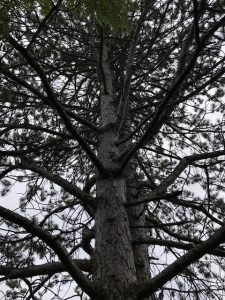?
April 18, 2020St. Salvayre, France
Wendell Berry’s poem, “The Peace of Wild Things”
“When despair for the world grows in me
and I wake in the night at the least sound
in fear of what my life and my children’s lives may be,
I go and lie down where the wood drake
rests in his beauty on the water, and the great heron feeds.
I come into the peace of wild things …”
Practice: Forest Bathing
Center for Action & Contemplation:
“The art of healing comes from nature, not from the physician.” –Paracelsus
Recently, in reference to concerns about COVID-19, I said, “Love always means going beyond yourself to otherness.” African American mystic Howard Thurman understood this deeply through a connection with nature which provided him with “a certain overriding immunity against the pains in life.” [3] In his youth he found solace in a relationship with a tree near his home. He writes:
Eventually I discovered that the oak tree and I had a unique relationship. I could sit, my back against its trunk, and feel the same peace that would come to me in my bed at night. I could reach down into the quiet places of my spirit, take out my bruises and joys, unfold them and talk about them. I could talk aloud to the oak tree and know that I was understood. It too, was part of my reality, like the woods . . . giving me space.
-Howard Thurman
During this time of social distancing from other humans, it is still possible for some of us to practice “ecotherapy” or in Japanese, Shinrin-yoku—refreshment and healing by walking or resting where there are trees or forests. For those who don’t have access to nature currently, I hope you will have an opportunity soon. I also have a feeling we will all have a newfound appreciation for the outdoors when this time of “sheltering in” is over. From M. Amos Clifford’s book Your Guide to Forest Bathing:
The invitation is simple: Walk slowly [or sit still], while silently noticing what is in motion in the forest. There is always movement, even when things seem perfectly still. Strands of a web drift in the air, trees move in the breezes, birds fly by, and squirrels scramble in the branches, grasses bend, insects crawl. . . .
Until you become accustomed to it, walking slowly for more than a few minutes is, paradoxically, stressful. . . . Because the mind and body are a single entity, slowing our body will also calm our mind. . . .
The eternal movement of the forest gives our minds something to engage with. Just as with sitting meditation the breath is always there and available for watching, in the forest there are always things in motion. Your mind will drift, and many other thoughts will arise. When they do, gently bring your attention back to noticing what’s in motion.
When you find you have automatically sped up, come to a complete halt for a moment. It’s an opportunity to fully give your attention to one thing, noticing how that thing is in motion. After a brief pause you’ll be ready to continue your slow walk.
I recommend that you walk like this for at least 15 minutes. That’s enough time for your mind to go through several cycles of distraction and calming. [5]
M. Amos Clifford, Your Guide to Forest Bathing: Experience the Healing Power of Nature (Conari Press: 2018), 34–35.
Ecological philosopher Joanna Macy understands: “Our difficulty in looking at what we’re doing to our world stems not from callous indifference or ignorance so much as it stems from fear of pain,” she says.
It is largely after the fact that faith is formed—and gloriously transmuted into hope for the future. Only after the fact can you see that you were being held and led during the fact.
-Richard Rohr
You say one love, one life (One life)
It’s one need in the night
One love (one love), get to share it
Leaves you darling, if you don’t care for it. U2
Living the Questions
On Being host Krista Tippett reflects on this moment as one of collective transition and ponders what we might integrate into the people we become on the other side of it.
Living the Questions: How can I find my footing in a shifting world?
To a question from listener Colorado Springs, Krista reflects on seeing this as a collective moment of transition (which is always stressful in human life) and ponders what we might integrate into the people we become on the other side of it. “To really, actively, accompany each other in holding that question — that might be a spiritual calling but also a civilizational calling for this very extraordinary transition,” she says.
❧
Ever again, though we've learned the landscape of love and the lament in the churchyard's names and the terrible, silent abyss where the others have fallen; ever again we walk out, two together, under the ancient trees, ever again find a place among wildflowers, under heaven's gaze. -Rilke, Uncollected Poems
The answers come in silence.
Died: April 18, 1955, in Princeton, New Jersey
“I think 99 times and find nothing. I stop thinking, swim in silence, and the truth comes to me.”
“Two things are infinite: the universe and human stupidity; and I’m not sure about the universe.”
The day after COVID protests in Michigan, Idaho, Wisconsin, Minnesota, Ohio, California, and Virginia:‘Amazing and depressing how much of politicized American individualism (on guns, on vaccines, now on COVID mitigation) is childish acting out, adults throwing tantrums when parental figures try to discourage or stop them from doing unwise things.’-Kurt Anderson, author of the book, How America Went Haywire
?
V
I
S
I
O
N
S
H
I
F
T

